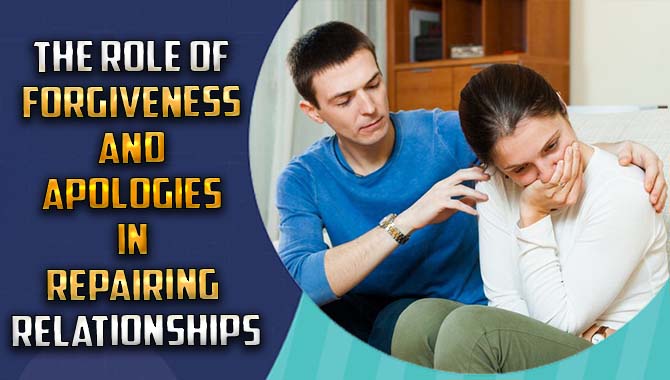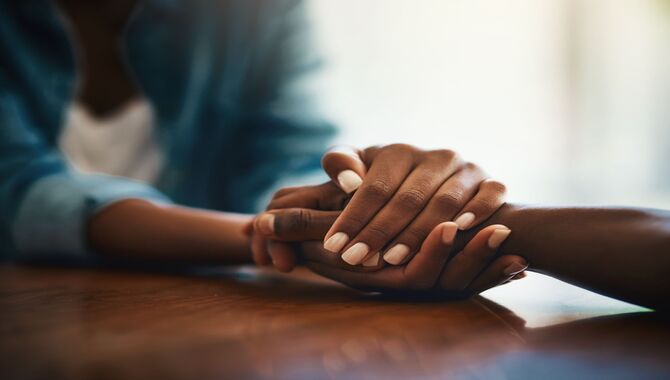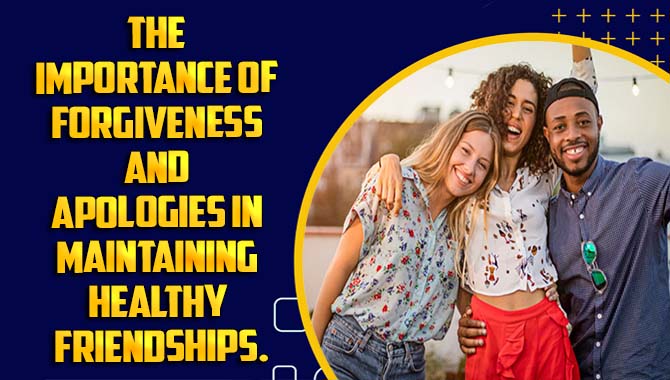Both forgiveness and apologies play an important role in repairing relationships.The role of forgiveness and apologies in repairing relationships Forgiveness and apologies are two key ingredients in repairing any kind of relationship.
It is very difficult to move on and rebuild trust if either party is still harboring resentment or feeling like they were wronged.Everyone makes mistakes, and being able to forgive and forget is essential for any kind of long-lasting relationship.
The act of apologizing shows that you are taking responsibility for your actions and that you are willing to change. It is a sign of strength and humility, and it can go a long way in repairing damaged relationships.
Forgiveness, on the other hand, is often seen as a sign of weakness. But it takes a lot of courage to forgive someone, especially if they have hurt you deeply. It is an act of compassion and love, and it can help to heal old wounds.Forgiveness and apologies are not always easy, but they are necessary steps in repairing any kind of relationship.

What Is The Role Of Forgiveness In Repairing Relationships?

Forgiveness is essential in repairing relationships as it allows for the release of resentment and bitterness, and provides an opportunity for reconciliation.The act of forgiveness is often thought of as something we do for other people. We may forgive someone for harming us, for example, or for causing us pain.
But forgiveness is also for our own benefit. It can lead to improved physical and mental health. It can help us move on from the hurt and pain that we’ve experienced. Forgiveness can even help improve our relationships.
When a relationship is harmed, it can be difficult to repair. But forgiveness can be an important step in rebuilding trust and closeness.Forgiveness doesn’t mean that what happened was okay. It doesn’t mean that you forget about what happened. Forgiveness is a choice to let go of anger and resentment.
Forgiveness can be hard. You may feel like you can’t forgive someone who has hurt you. But it’s important to remember that forgiveness is a process.It may take time to forgive someone. But the more you work on forgiveness, the easier it will become.
Here are some tips for how to forgive:
- Acknowledge your feelings. It’s okay to be angry, hurt, or sad. Give yourself time to process your feelings.
- Talk about what happened. Talk to the person who hurt you, or to someone else who can help you process what happened.
- Write about what happened. Writing can be a helpful way to process your thoughts and feelings.
- Let go of your anger. Forgiveness doesn’t mean that you forget about what happened. But it does mean that you let go of your anger.
- Make a decision to forgive. Forgiveness is a choice. Choose to forgive the person who hurt you.
- Be patient. Forgiveness is a process. It may take time to forgive someone. But the more you work on forgiveness, the easier it will become.
Here’s an example:
Lisa and her husband, John, have been married for 10 years. They have two young children. Lisa is a stay-at-home mom, and John works long hours at his job.
Recently, John has been working even longer hours. He’s been coming home later and later. And when he is home, he’s been preoccupied with work. He’s been short-tempered with Lisa and the kids.
Lisa is hurt and angry. She’s been feeling lonely and neglected. She’s been wondering if John even cares about her anymore.
One day, Lisa confronts John about his behavior. They talk about how his work hours have been affecting their relationship. John admits that he’s been neglecting Lisa and the kids. He says he’s sorry and he wants to make things right.
Lisa is angry, but she decides to forgive John. She knows that forgiveness is important for her own health and for the health of their relationship.
She also knows that forgiveness is a process. It will take time, but she’s willing to work on it. What Is The Role Of Apologies In Repairing Relationships?Apologies are a way to take responsibility for your actions and to show remorse for hurting someone.
When a close relationship is damaged, it’s natural to want to try to repair it. One way to
Do this is to apologize. But what is the role of apologies in repairing relationships?An apology is an expression of regret for something that has caused hurt or offense. It is a way of taking responsibility for our actions and trying to make things right.
When we apologize, we are acknowledging that we have done something wrong and that we are sorry for the pain that we have caused. This can be a powerful way to start the process of repairing a relationship.An apology can help to rebuild trust and improve communication. It can also help to resolve conflict and bring about forgiveness.
However, it’s important to remember that an apology is only one part of the process. It is not a magic fix that will instantly repair all the damage. It takes time, patience, and effort to rebuild a close relationship.If you’re considering apologizing to someone, it’s important to do it in a way that is genuine and heartfelt. A sincere apology can go a long way towards repairing a relationship.
Here’s a real-life example:
Two friends have a falling out and stop speaking to each other. After some time has passed, one of the friends decides to reach out and apologize.
She admits that she was wrong and that she’s sorry for the hurt that she caused. The other friend is receptive to the apology and they begin to rebuild their friendship.
How Can Forgiveness And Apologies Help Repair Relationships?

Forgiveness and apologies can help repair relationships by providing a way to move past hurt feelings and resentment.When we think about the benefits of forgiveness, we typically think about how it can help us move on from hurt and pain. What we may not realize is that forgiveness can also help repair relationships.
When we forgive someone, we are letting go of the anger and hurt we feel towards them. This can help open the door to communication and understanding. It can also help us see the other person in a more positive light.
If you’re looking to repair a relationship, forgiveness and apologies can be a good place to start. By forgiving the other person, you’re showing them that you’re willing to move past the hurt. And by apologizing, you’re taking responsibility for your role in the conflict.
Of course, forgiveness and apologies are just one part of repairing a relationship. It’s also important to communicate openly and honestly about what happened. But if you’re looking to take the first step, forgiveness and apologies can be a good place to start.
What Are The Benefits Of Forgiving Someone Who Has Hurt You?

The benefits of forgiving someone who has hurt you are that it can help to heal the hurt, to let go of anger and resentment, to move on from the event, and to improve your own mental and physical health.It can be difficult to forgive someone who has hurt you, but it is important to remember that forgiveness is a choice.
Forgiveness is not about condoning the hurtful behavior or forgetting what happened. Instead, forgiveness is about letting go of anger and resentment and choosing to move on.
There are many benefits to forgiving someone who has hurt you. Forgiving can help reduce stress and anxiety, lower blood pressure, and improve your overall physical and mental health.Forgiving can also help improve your relationships and allow you to move on from the hurt.
Letting go of anger and resentment can be difficult, but it is important to remember that forgiveness is a choice.Forgiveness is not about condoning the hurtful behavior or forgetting what happened. Instead, forgiveness is about letting go of anger and resentment and choosing to move on.
There are many benefits to forgiving someone who has hurt you. Forgiving can help reduce stress and anxiety, lower blood pressure, and improve your overall physical and mental health.Forgiving can also help improve your relationships and allow you to move on from the hurt.If you are struggling to forgive someone who has hurt you, there are a few things you can do to make it easier.
First, try to understand why the person may have acted the way they did. Second, work on letting go of any anger or resentment you may be feeling. Lastly, make a conscious decision to forgive the person.
If you are having difficulty forgiving someone, it may be helpful to talk to a therapist or counselor. They can help you work through the hurt and anger you are feeling and help you find ways to let go and move on.
What Are The Benefits Of Apologizing After Hurting Someone?

The benefits of apologizing after hurting someone are that it can help rebuild trust, show remorse, and help prevent further hurt.
When we make a mistake and hurt someone, it’s important to apologize. Not only does this help the other person feel better, but it can also help to repair and improve the relationship.
There are many benefits to apologizing, even if we don’t feel like we did anything wrong. For one, it shows that we care about the other person and their feelings. It also demonstrates our willingness to take responsibility for our actions and to make things right.
Apologizing can also help diffuse anger and prevent further conflict. It shows that we’re willing to listen to the other person and to try to understand their perspective. And, in some cases, a sincere apology can even lead to forgiveness and a stronger relationship.
Of course, there are also times when an apology is not appropriate or warranted. If we’ve been the victim of a serious wrong, such as abuse or betrayal, an apology from the perpetrator is not likely to be helpful.
In these cases, it’s more important to seek professional help or support from loved ones.
If you’re not sure whether or not to apologize, it’s always best to err on the side of caution. A sincere “I’m sorry” can go a long way toward repairing a damaged relationship.
FAQs
1.What If The Person You Need To Forgive Doesn’t Want To Be Forgiven?
Ans: If the person you need to forgive doesn’t want to be forgiven, you may need to respect their wishes. However, you can still forgive them in your heart.
Forgiving someone doesn’t always mean that you have to have a relationship with them. You can forgive someone and still choose to distance yourself from them if you need to.
2.What If The Person You Need To Apologize To Doesn’t Want To Hear Your Apology?
Ans: If the person you need to apologize to doesn’t want to hear your apology, you may need to respect their wishes and move on.
If you feel that you absolutely must apologize to this person, you could try writing a letter or sending a gift. Ultimately, however, it is up to the person who was wronged to decide whether or not they want to accept your apology.
3.What Are Some Other Ways To Repair Relationships Besides Forgiveness And Apologies?
Ans: There are many ways to repair relationships besides forgiveness and apologies.
Some other ways to repair relationships include spending time together, communicating openly and honestly, being respectful and considerate, and being willing to compromise.
4.Is It Ever Too Late To Apologize Or Forgive?
Ans: No, it is not too late to apologize or forgive. Everyone makes mistakes, and it is always better to try and make things right rather than to hold a grudge.
Forgiveness can be difficult, but it can also be liberating. Apologizing shows that you are willing to take responsibility for your actions and that you are willing to try and fix things.
5.What Are The Consequences Of Not Forgiving Or Apologizing?
Ans: The consequences of not forgiving or apologizing can be very serious. Not forgiving someone can lead to resentment and bitterness, which can poison a relationship.
Additionally, not apologizing for something you’ve done wrong can damage your relationships with others and make them less likely to trust you in the future.
Conclusion
Forgiveness and apologies are integral in repairing relationships. They allow individuals to move past transgressions, build trust, and foster understanding.
When used effectively, forgiveness and apologies can help individuals to grow closer to one another and create a more positive and productive relationship.
I hope you understand now. If you still have questions, please comment below about “The role of forgiveness and apologies in repairing relationships.”

